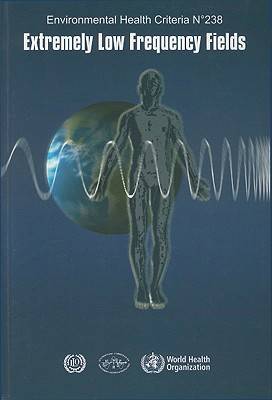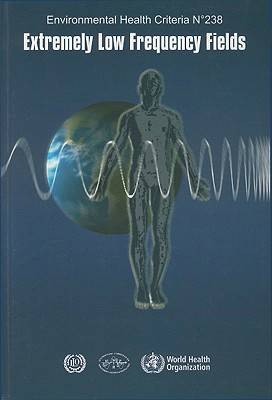
Bedankt voor het vertrouwen het afgelopen jaar! Om jou te bedanken bieden we GRATIS verzending (in België) aan op alles gedurende de hele maand januari.
- Afhalen na 1 uur in een winkel met voorraad
- Gratis thuislevering in België vanaf € 30
- Ruim aanbod met 7 miljoen producten
Bedankt voor het vertrouwen het afgelopen jaar! Om jou te bedanken bieden we GRATIS verzending (in België) aan op alles gedurende de hele maand januari.
- Afhalen na 1 uur in een winkel met voorraad
- Gratis thuislevering in België vanaf € 30
- Ruim aanbod met 7 miljoen producten
Zoeken
€ 91,95
+ 183 punten
Omschrijving
This monograph represents the most thorough health risk assessment currently available on extremely low frequency electric and magnetic fields. In October 2005, WHO convened a Task Group of scientific experts to assess any risks to health that might exist from exposure to ELF electric and magnetic fields in the frequency range >0 to 100 000 Hz (100 kHz). The Task Group reviewed evidence for a number of health effects and updated the evidence regarding cancer. The conclusions and recommendations of the Task Group are presented in this volume.
This volume addresses the possible health effects of exposure to extremely low frequency (ELF) electric and magnetic fields. It reviews the physical characteristics of ELF fields, as well as the sources of exposure and measurement. However, its main objectives are to review the scientific literature on the biological effects of exposure to ELF fields in order to assess any health risks from exposure to these fields and to use this health risk assessment to make recommendations to national authorities on health protection programs.
The frequencies under consideration range from above 0Hz to 100kHz. By far the majority of studies have been conducted on power-frequency electric fields. In addition, there have been a number of studies concerning very low frequency (VLF, 3-30 kHz) fields, switched gradient magnetic fields used in magnetic resonance imaging, and the weaker VLF fields emitted by visual display units and televisions.
This monograph summarizes the main conclusions and recommendations from each section as well as the overall conclusions of the health risk assessment process. The terms used in this monograph to describe the strength of evidence for a given health outcome are as follows. Evidence is termed "limited" when it is restricted to a single study or when there are unresolved questions concerning the design, conduct, or interpretation of a number of studies. Inadequate evidence is used when the studies cannot be interpreted as showing either the presence or absence of an effect because of major qualitative or quantitative limitations, or when no data is available.
Key gaps in knowledge were also identified and the research needed to fill these gaps has been summarized in the section entitled "Recommendations for research."
This volume addresses the possible health effects of exposure to extremely low frequency (ELF) electric and magnetic fields. It reviews the physical characteristics of ELF fields, as well as the sources of exposure and measurement. However, its main objectives are to review the scientific literature on the biological effects of exposure to ELF fields in order to assess any health risks from exposure to these fields and to use this health risk assessment to make recommendations to national authorities on health protection programs.
The frequencies under consideration range from above 0Hz to 100kHz. By far the majority of studies have been conducted on power-frequency electric fields. In addition, there have been a number of studies concerning very low frequency (VLF, 3-30 kHz) fields, switched gradient magnetic fields used in magnetic resonance imaging, and the weaker VLF fields emitted by visual display units and televisions.
This monograph summarizes the main conclusions and recommendations from each section as well as the overall conclusions of the health risk assessment process. The terms used in this monograph to describe the strength of evidence for a given health outcome are as follows. Evidence is termed "limited" when it is restricted to a single study or when there are unresolved questions concerning the design, conduct, or interpretation of a number of studies. Inadequate evidence is used when the studies cannot be interpreted as showing either the presence or absence of an effect because of major qualitative or quantitative limitations, or when no data is available.
Key gaps in knowledge were also identified and the research needed to fill these gaps has been summarized in the section entitled "Recommendations for research."
Specificaties
Betrokkenen
- Auteur(s):
- Uitgeverij:
Inhoud
- Aantal bladzijden:
- 543
- Taal:
- Engels
- Reeks:
- Reeksnummer:
- nr. 237
Eigenschappen
- Productcode (EAN):
- 9789241572385
- Verschijningsdatum:
- 15/12/2007
- Uitvoering:
- Paperback
- Formaat:
- Trade paperback (VS)
- Afmetingen:
- 142 mm x 208 mm
- Gewicht:
- 780 g

Alleen bij Standaard Boekhandel
+ 183 punten op je klantenkaart van Standaard Boekhandel
Beoordelingen
We publiceren alleen reviews die voldoen aan de voorwaarden voor reviews. Bekijk onze voorwaarden voor reviews.









